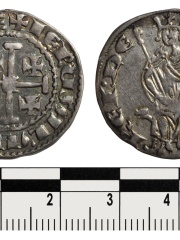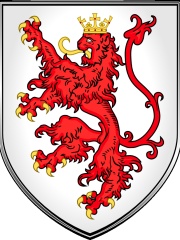

The Most Famous
NOBLEMEN from Cyprus
This page contains a list of the greatest Cypriot Noblemen. The pantheon dataset contains 1,415 Noblemen, 2 of which were born in Cyprus. This makes Cyprus the birth place of the 38th most number of Noblemen behind North Korea, and Lithuania.
Top 2
The following people are considered by Pantheon to be the most legendary Cypriot Noblemen of all time. This list of famous Cypriot Noblemen is sorted by HPI (Historical Popularity Index), a metric that aggregates information on a biography's online popularity.

1. Henry II of Jerusalem (1271 - 1324)
With an HPI of 71.17, Henry II of Jerusalem is the most famous Cypriot Nobleman. His biography has been translated into 27 different languages on wikipedia.
Henry II (June 1270 – 31 March 1324) was the last crowned King of Jerusalem (after the fall of Acre on 28 May 1291, this title became empty) and also ruled as King of Cyprus. He was of the Lusignan dynasty. He was the second surviving son of Hugh III and succeeded his brother John I on 20 May 1285; there was some suspicion that Henry had been involved in poisoning John. He was crowned at Santa Sophia, Nicosia, 24 June 1285. Charles I of Anjou, who contested John's claim to the throne, had died in 1285, allowing Henry to recover Acre from the Angevins. With a fleet Henry attacked Acre, defended by Charles' lieutenant Hugh Pelerin, and the city was captured on 29 July 1285. Henry had himself crowned king of Jerusalem on 15 August 1286 in Tyre by Archbishop Bonacursus de Gloire, but returned to Cyprus and appointed his uncle Philip of Ibelin as bailiff in his absence. By this time Acre was one of the few coastal cities remaining in the remnant of the Kingdom of Jerusalem. During his reign the Mameluks captured Tyre, Beirut, and the rest of the cities, and destroyed the similarly weakened County of Tripoli in 1289. The final siege of Acre began on 5 April 1291 with Henry present in the city. He escaped to Cyprus with most of his nobles, and the city fell to Khalil on 28 May 1291. Henry continued to rule as king of Cyprus, and continued to claim the kingship of Jerusalem as well, often planning to recover the former territory on the mainland. He attempted a coordinated military operation in 1299/1300 with Ghazan, the Mongol Ilkhan of Persia, when Ghazan invaded Mameluk territory in 1299 (see Franco-Mongol alliance); he tried to stop Genoese ships from trading with the Mameluks, hoping to weaken them economically; and he twice wrote to Pope Clement V asking for a new crusade. His reign in Cyprus was prosperous and wealthy, and he was very much involved with the justice and administration of the kingdom – he had the Haute Cour keep written records for the first time (in Italian or French, rather than Latin), and extended the court's role from a feudal advisory body to a true court responsible for trying and punishing criminals. However, Cyprus was in no position to fulfill his true ambition, the recovery of the Holy Land. He suffered from epilepsy, which at times incapacitated him, and his nobles were unsatisfied with him. He had his brother Guy, the Constable of Cyprus, put to death in 1303 for conspiring against him. In 1306 his brother Amalric, Lord of Tyre, Constable of Jerusalem, conspired with the Templars to remove him from power. However, Amalric assumed the title of governor and regent of Cyprus, rather than of King. Henry was deposed on 26 April 1306 and exiled to Armenia, where King Oshin of Armenia was Amalric's brother-in-law. However, upon the murder of Amalric in 1310, Oshin released Henry, who returned to Cyprus and resumed his throne with the aid of the Hospitallers on 26 August 1310, imprisoning many of Amalric's co-conspirators, including their brother Constable Aimery, brother-in-law Balian II of Ibelin, Prince of Galilee, and other relatives of Balian. In 1313, he oversaw the dissolution of the Templars in Cyprus and the transfer of their property to the Hospitallers. He married Constance of Sicily (1303/1307 – in Cyprus after 19 June 1344), daughter of Frederick III of Sicily and Eleanor of Anjou, at Santa Sophia, Nicosia, on 16 October 1317 but they didn't have any children. She later married Leo IV of Armenia and John of Lusignan, titular prince of Antioch. Henry died on 31 March 1324 at his Villa in Strovolos, near Nicosia, was buried at the Franciscan Church of Nicosia and was succeeded by his nephew Hugh IV.

2. Amalric, Lord of Tyre (1272 - 1310)
With an HPI of 62.54, Amalric, Lord of Tyre is the 2nd most famous Cypriot Nobleman. His biography has been translated into 15 different languages.
Amalric, Lord of Tyre, also called Amalric of Lusignan or Amaury de Lusignan (c. 1272 – June 5, 1310, in Nicosia) was a prince and statesman of the House of Lusignan, a younger son of King Hugh III of Cyprus and Isabella of the House of Ibelin. He was given the title of Lord of Tyre in 1291, shortly before the city of Tyre fell to the Mamluks of Egypt. He is often but incorrectly called the Prince of Tyre. In April 1306, with the support of the barons, Amalric forced his brother Henry II to cede authority to him. He thereafter governed Cyprus as "rector, governor and administrator", effectively regent, until his assassination.
People
Pantheon has 2 people classified as Cypriot noblemen born between 1271 and 1272. Of these 2, none of them are still alive today. The most famous deceased Cypriot noblemen include Henry II of Jerusalem, and Amalric, Lord of Tyre.

